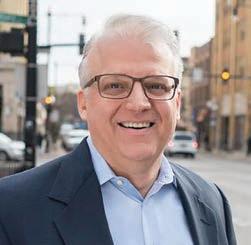RESOURCE
EQUIPPING CHURCH LEADERS EVENTS
& SERVICES
SEPTEMBER – DECEMBER
NOW GEN
(not next gen)
Polishing our perspective on the rising generation
See-through leadership
4 age groups see life differently
Haydn Shaw
Finding your calling
Will Mancini
FALL 2020

ILLINOIS BAPTIST STATE ASSOCIATION
Pandemic outreach & Navigating the political season
+
Mission Illinois Offering & Week of Prayer
September 13-20, 2020
Please encourage your church to participate.
This year is different
The second week of September is the time each year that we ask for prayer for state missions, and
receive a special offering for our work
together as Illinois Baptists. This year,
the Mission Illinois Offering & Week of
Prayer looks different, because this year is different.
Pandemic demands response
Rather than sharing missions and
evangelism stories from across the state, we thought we should focus on response to the pandemic. Nothing like this has happened in our lifetimes. And
nothing has had a more dramatic impact on churches and on ministry, demanding the best from all of us.
IBSA helps churches pivot

This year, IBSA has turned our ministry
to meet the urgent needs of churches
during this time. We have used the
word “pivot” often since March. With
church facilities closed and worship
services severely limited, our

missionaries and staff turned to
problem solving and ministry
innovation to help churches find new ways to serve. We have found churches
resilient and eager to learn and adapt.
We have all grown stronger during this time of crisis.
Higher goals support state mission advance
2020 is the year we all leaned into this significant challenge. And this was possible because Illinois churches gave generously to support state missions.

Thank you, and we welcome your
continued prayers and support.
missionillinois.org
Nate Adams IBSA Executive Director

The pandemic demands a fresh approach to state missions.
we’re doing it. Together,
Most years, about half of IBSA churches give around $350,000. This year, we need more churches and higher goals supporting state missions.
INSIDE
INSIGHT
2 Eric Reed
Editor’s note: Have you heard from the kids lately?
6 Carmen Halsey
Online breakthroughs for leaders
ILLINOIS BAPTIST STATE ASSOCIATION

EDITOR
Eric Reed
DESIGNER
Kris Kell
SOCIAL MEDIA MANAGER
Lisa Misner
They’re
Plus:
7 Jack Lucas
Keeping students connected— and out of trouble

8 Brad Lovin Missions plan: ready, set, wait
9 Lisa Misner
Can churches have a peaceful election season?
32 Daniel Chung
A final word
21 Calendars and ideas for autumn
EDITORIAL CONTRIBUTORS
Meredith Flynn
Leah Honnen
Published three times each year, Resource provides new information about IBSA ministries, equipping opportunities, and services. This periodical is sent free of charge to church leaders. To request more copies for your leaders, contact Communications@IBSA.org. Resource is also available online at http://resource. IBSA.org.
For questions about subscriptions, articles, or events, contact the IBSA Communications Team at (217) 391-3119 or e-mail Communications@IBSA.org.
27 IBSA services, facilities, and partners
POSTMASTER: Resource is owned and published 3 times each year (Jan., May, and Sept.) by the Illinois Baptist State Association, 3085 Stevenson Drive, Springfield, Illinois 62703-4440.
IBSA.org 01
MEET GEN Z
10
the now generation, not the next generation
Meredith Flynn
church.
Young people are lonely. And that’s why they need your
YOUR CALLING
expert Will Mancini
identify divine direction
SEE-THROUGH LEADERSHIP
necessity of transparency
VERY DIFFERENT PERSPECTIVES
areas where generations
have to agree to disagree
INTERACTIVE: REVERSE MENTORING
room at the table
13 FINDING
Leadership
helps
15
The
Kevin Jones 18
Five
will
20
Making
PLANNER
EQUIPPING
FALL 2020
LEADER LIFE
Walk Worthy
Read 1 Timothy 4:2
Paul’s advice to Timothy is partly about the prejudices of older believers, that a young person may not be ready to take a senior ministry position. After all, they’re used to elder statesman Paul. But his instruction is also about the attitudes and actions of the younger man.
Paul encourages Timothy to be exemplary in his teaching, behavior, relationships, and in the quality of his faith walk. In other words, don’t give the critics anything to criticize.
That’s a tall order for any leader, especially a younger one. This offers us opportunity to give guidance not just in the work of ministry, but in the character behind it.
ASK: Does anything in my actions convey “looking down” on young people?

Who is my Timothy?
How can I encourage and challenge without offending?
Heard from the kids?
The first time I recall feeling old I was only 34.
I was the pastor, and the youth minister, a decade younger, had let me know by some word or look that I was not in touch with what the students were thinking on a particular issue. That may be when I realized that keeping up with the kids required work.
It wasn’t a matter of being cool or staying on trend. It was the realization that young people think differently— partly because of their life stage which stands in growing contrast to mine, and even more because the culture is changing rapidly.
I’ve heard grandparents say they don’t enjoy social media, “but I have to do it if I want to stay in touch with my family.” My friend Sandy was a pioneer in this area when she explained Marco Polo to me a few years ago. It’s an app for posting short videos. She and her granddaughter, now 16, swap videos several times each week.
Today there’s TikTok and much more. As Twitter, Instagram, and Snapchat have gone mainstream, younger people have moved on to new platforms. And their parents and grandparents are tailing them like dogs after a fox.
Does it feel like that in the church?
Younger people are engaged with each
other in language and media all their own. Likewise for older people. That’s most noticeable in leadership and evangelism. Finding points of connection—or creating them when they aren’t so natural—is mandatory if the generations are to know each other and to work together to further the gospel.
I heard of a church recently that reviewed its communication plans. Through a survey, older adults expressed a preference for one social media platform, while younger people favored a different one. So, the church chose to use both. As a result, the age groups never communicated. They had no natural intersection.
The ultimate outcome of this dichotomy is the single-generation church. A Boomers-only church hangs on until the end, while a Gen-X, Y, or Z church plant starts up, at first to reach college students, then never reaches beyond its own generation. We’ve seen it happen many times. The single-gen church is a guaranteed path to obsolescence. The same is true for the single-gen deacon board, elders, or leadership team.
It’s hard keeping up with the kids. Mature believers will be required to adapt for the sake of newer ones. But it’s worth it.
02 RESOURCE FALL 2020
Eric Reed is editor of IBSA media.
DIRECTORY



Executive
Operations Team



Communications








IBSA IBSA.org 03
391-3108 John
Engagement Coordinator (573) 247-5535
Team Nate Adams Executive Director (217)
Carruthers Church
Jeff
Administrative Director (217) 391-3104 Carole
Administrative Coordinator (217) 391-3113 Drew
Information & Technology Services Director (217) 391-3112 Kendra
(217) 391-3111 Ashley
Accountant (217) 391-3106
Deasy
Doom
Heironimus
Jackson Bookkeeper
Parsons
Illinois Baptist (217) 391-3109
Assistant (217) 391-3127 Kris
(217) 391-3115 Lisa
Social Media & Public Policy Manager (217) 391-3119
(217) 391-3120
391-3107
Team Eric Reed Administrative Director Editor,
Leah Honnen Administrative
Kell Production Manager
Misner
Meredith Flynn Content Manager Managing Editor Illinois Baptist
Barb Troeger Executive Assistant (217)
Mark Emerson Associate Executive Director (217) 391-3136
Leadership Development Team
Revitalization Team



















IBSA Camps

04 RESOURCE FALL 2020
DIRECTORY
Brock Vandever Manager Lake Sallateeska Baptist Camp (618) 318-9424 Carmen Halsey Leadership Development Director (217) 391-3143 Jack Lucas Leadership Development Director (217) 391-3135 Jacob Kimbrough Manager Streator Baptist Camp (815) 992-5947 Tammy Butler Ministry Assistant (217) 391-3124
Debbie Muller Ministry Assistant (217) 391-3126
Tammy Ratsch Ministry Assistant (217) 391-3128
Tim Bailey CP – Catalyst Northeast Region (814) 221-4173
Jorge Melendez CP – Catalyst (630) 710-3106
Eddie Pullen Church Planting Director (618) 751-0695 Ken Wilson CP – Catalyst Central, Southern Regions (618) 697-1036 John Yi CP – Catalyst Northeast Region (312) 608-0349 Kim Ayers Ministry Assistant (217) 391-3101
Scott Foshie Revitalization Director (217) 391-3122
Linda Darden Ministry Assistant (217) 391-3137
Brad Lovin Administrative Director/Missions (217) 391-3131
Mobilization Team Kevin Jones Church Planting Director (217) 391-3123 Butch Porter Disaster Relief (618) 499-2215
Aubrey Krol Ministry Assistant (217) 391-3138 Ben Jones Leadership Development Director (217) 391-3140
Zone Consultants
(312) 493-3726
(630) 908-0853
(217) 494-1447
IBSA Zones 1-10
(217) 685-9184
(618) 946-9402
To e-mail IBSA staff, type the first and last name (no spaces) @IBSA.org.

Example: LisaMisner@IBSA.org
Local Associations
ANTIOCH (618) 695-2762
BAY CREEK (217) 222-8867
BIG SALINE (618) 841-9064
CENTRAL (217) 330-7593
CHICAGO METRO (773) 278-4400
CLEAR CREEK (618) 833-4481
EAST CENTRAL (217) 586-5599
FOX VALLEY (573) 579-8143
FRANKLIN (618) 439-3742


GATEWAY (618) 254-3953
GOSHEN TRAIL (618) 839-2981
GREATER WABASH (618) 847-3041
HEARTLAND NETWORK (217) 529-3429
KASKASKIA (618) 227-0001

LAKE COUNTY (847) 336-3960
LOUISVILLE (618) 283-0842
MACOUPIN (217) 854-8279



METRO EAST (618) 624-4444
METRO PEORIA (309) 369-1403
NINE MILE (618) 615-9095
NORTH CENTRAL (773) 354-4754
OLNEY (618) 392-7001
PALESTINE (618) 569-3189
QUAD CITIES (309) 221-4143
REHOBOTH (618) 283-0842
SALEM SOUTH (618) 242-7862




SALINE (618) 252-1440
SANDY CREEK (217) 882-2231
SINNISSIPPI (815) 631-4182
THREE RIVERS (815) 725-7361
UNION (618) 524-9738
WEST CENTRAL (309) 351-5499
WESTFIELD (217) 549-8690
WILLIAMSON (618) 993-6069


IBSA.org 05 DIRECTORY
Joe Oliver Zone 2 (847) 754-0356
Brian McWethy Zone 4 (815) 901-2767
Joe Gardner Zone 5 (309) 369-1403
Bob Evaul Zone 7 (618) 567-6170
Larry Rhodes Zone 8 (618) 972-5683
Steve Neill Zone 9
1 2 3 4
6 7 8 9 10
Cliff Woodman Zone 6 (618) 946-5720
5
Pat Pajak Zone 3
Bryan Price Zone 1
Nathan Carter Zone 1
Ashby Tillery Zone 10
LEADERSHIP
DEVELOPMENT
Leaders, log in
Training
One of our newest leadership development tools has become even more important in recent days.
Increasingly, IBSA’s Leadership Development Team has utilized online learning to equip leaders with specific skills and resources. Most recently, our newest webinar series launched to help churches navigate the Coronavirus pandemic.
We’ve found webinars to be a great fit for leaders who are dispersed far and wide geographically, and who have busy schedules that make it difficult to get out of town for a meeting or conference. Amid Illinois’ stay-at-home order, webinars are an accessible way for leaders to get the relevant training they need for the current ministry challenges we’re facing.
Webinars give participants a way to engage with experts they would likely never meet in person. Viewers are face-to-face with high-quality teachers and trainers. If they’re watching in real time, participants have the opportunity to ask questions and get the answers right away.
I’ve seen webinars work well for busy leaders because there’s very little required of you as a participant. You don’t even have to be there on time–every episode is available to view after it’s recorded. Webinars allow us to speak to specific audiences about specific topics. Instead of talking about the abstract concept of leadership, for example, we can train leaders on specific competencies and skills.
Webinars also give us the opportunity to hear from experts who might not be available to travel to Illinois, but will gladly log on for an hour and share their wisdom on a specific topic.
IBSA’s Church Helps webinars launched to help churches with issues related to COVID-19. Future sessions will address a range of current concerns churches are facing. Additionally, IBSA has launched two
webinars to help pastors and ministry teams grow in specific areas, and a series for pastors at various stages of the church revitalization process.
Pastor Plus | Designed as a practical guide for pastors, Pastor Plus is a webinar series on individual functions of the church leader, like baptism, communion, and officiating a funeral. Each session offers on-the-job training for new pastors, or a refresh for any leader in need of it.
Leading to the Next Level | We believe that leadership development is discipleship. This series helps develop leaders in the local church, equipping them to do the work of the church. The webinars are for pastors, staff, small group leaders, marketplace missionaries, and any and all future leaders. Topics include leading and managing change, emotional intelligence, and dealing with toxic people.
ReVision Revitalization | Led by IBSA’s Scott Foshie and special guest Rob Peters of Corpus Vitae, this 8-session webinar series helps pastors assess themselves and their congregation as they prepare to lead through change in the church. Topics include re-envisioning pastoral leadership, casting a compelling vision, and creating a culture for change.
Would you consider joining a webinar? Go to IBSA.org/leadershipdevelopment for more information about each current series, to view past sessions, and to sign up for the next one.
CARMEN HALSEY is IBSA’s leadership development director. CarmenHalsey@IBSA.org

06 RESOURCE FALL 2020
that’s specific and always accessible
Questions for a new era
The lasting impact of our online season
My recent conversation with a student minister reminded me of a unique challenge brought on by all the virtual gatherings we’ve had during the Coronavirus pandemic. He had become aware of the need to plan guys-only and girls-only online meetings, so that leaders could ask students difficult accountability questions about their screen time.
In other words, he wanted to make sure students were fleeing the temptations so easily available online—now that much of their day is spent using a screen to do all the things they used to do at school and at church.
That’s just one of the discipleship issues that have risen out of the sudden need to change almost everything about how we do church and ministry. There are others too—questions we’ve been forced to ask amid a pandemic, which will have an effect even after this particular time of ministry challenge:
1. Are we aware of online temptation, even if that temptation is simply to spend too much time online? How can we be constructive about “virtual time”—now that it’s taking up an even larger part of your life?
2. How do you spend your time when many normal commitments are put on hold? Do you increase your Bible reading? Spend more time in devotional-type activities?
3. When life is temporarily interrupted, how much of what you do affects your faith and spiritual growth positively? Or negatively?
Resources I recommend:
LifeWay Kids at Home is designed to help parents teach the Bible to their children. Go to kidsministry.lifeway.com to register for this free resource.
Across Illinois, the pandemic forced pastors and ministry leaders to meet in virtual small groups to help Christians grow, when they weren’t able to meet in-person at the church. Some community groups or Sunday school classes included several families or couples; others involved only two or three people.
Whatever the online setting, our virtual meet-ups give us a great opportunity to ask some questions specific to this unprecedented time. They also are an excellent way to ramp up community among specific groups.
For example, most student ministers have worked hard during our stay-at-home order to provide even more activities than usual—small group Bible studies, online movie nights, virtual scavenger hunts.
For parents, several weeks of uninterrupted family time has been an excellent opportunity to grow as the chief disciplers of their children. And for churches, this is an ideal time to train parents how to do that. At a church I previously served, we held a Sunday school teachers’ meeting every Wednesday night. I taught that week’s lesson to the teachers, who then taught it a few days later to students in their classrooms.
There are a variety of ways to institute a teachers’ meeting for parents right now. We have the technology and the time, and the blessing of an opportunity we couldn’t have anticipated.
Let’s not neglect discipleship now, even though our methods and our questions are different. As Christians, let’s commit to steward our time for his glory. As leaders, let’s help the people we lead use this time to grow closer to Jesus.
JACK LUCAS is IBSA’s leadership development director. JackLucas@IBSA.org

IBSA.org 07
DISCIPLESHIP
Preparing to mobilize again Start the process with personal testimonies
After living in Illinois for nearly two months, my oldest son was struggling with the transition. Many evenings, he would find somewhere to hide and cry as he struggled through sadness and anger in his heart. My wife and I sought to give him perspective on how God is faithful to our family, but anger was consuming his 10-year-old heart.

Each time I sensed his absence, I would search the house until I found him. He expressed that he was angry with me, my wife, and God for taking away the things that he loved. He struggled to understand why God would call our family to leave what he saw as a “good life.” Actually, he was wrestling through idolatry of those “good things” in his heart.
One night after he should have been in bed, my son came downstairs to find my wife and me. Over the next 30 minutes of conversation, we saw our son being broken and repenting of his sin as he committed to following God. Our eyes were filled with tears as he prayed the gospel to God and asked for his heart to be changed. At the completion of his prayer, I challenged my son to tell someone the next day about his decision to follow Christ. I wanted to cultivate in him immediately a need to tell others his testimony. The next day he was eager to tell his testimony to his younger sister and even penned a letter to his best friend in North Carolina.
In John 4, Jesus has an encounter with a Samaritan woman at a well. In this exchange, Jesus offers the woman “living water” through the gift of his grace.
Upon understanding that Jesus is the Messiah, she left immediately to go tell others about Jesus. The Samaritan woman even left her jar for drawing water, a physical representation of her new spiritual reality.
Jesus had sent his disciples into the town to buy food.
When they returned, Jesus saw his followers missed the real objective, which was to engage with the Samaritan town. Fortunately, Jesus had another plan. The Samaritan woman went into the town and shared her testimony, which led others to believe in Jesus.
Our testimony allows others to relate to our experience and encounter the living Jesus. Statistics indicate as few as 2% of regularly attending church members share their testimony.
When we foster an atmosphere in our churches which celebrates the transformative power of the gospel, church members will be compelled to find more opportunities to share their testimony with others. In order to create a culture of going and telling about Jesus, we must consider the following steps.
1. Invest time equipping and challenging church members to share their testimony. Many people do not share the gospel because they feel ill-equipped or consider it to be someone else’s responsibility.
2. Find time for leaders to practice and promote their own testimony in front of other church members.

3. Provide time in the normal schedule of the church for attendees to share their testimony. Consider setting aside time monthly for someone to give their testimony in church, Sunday School, or small group.
Church members will prioritize what they see and hear in church.
08 RESOURCE FALL 2020
MISSIONS
BRAD LOVIN is IBSA’s administrative director of missions mobilization. BradLovin@IBSA.org
Let’s not get (too) political
People can be very passionate about their beliefs. Religion and politics are two of the areas where people can become the most passionate, sometimes too much so, resulting in terrible arguments and division.
Most Christians are familiar with Matthew 22:20-22, when the Pharisees tried to trip Jesus up by engaging him in a political debate:
“‘Whose image and inscription is this?’ he asked them. ‘Caesar’s,’ they said to him. Then he said to them, ‘Give, then, to Caesar the things that are Caesar’s, and to God the things that are God’s.’ When they heard this, they were amazed. So, they left him and went away.”
As we enter into the homestretch of the 2020 election season, we would do well to remember Jesus’ words. We should also think about what we personally can be doing to prepare, and what our churches can be doing. Here are few things to think about:
Educate yourself. The Apostle Paul wasn’t afraid to engage the culture, but he knew where God stood on the issues, and Paul stood right there with him. Our culture believes each individual has their own truth. As Christians we know God is the only truth. Remember the old saying: if you don’t stand for something, you’ll fall for anything.
Diversify. Don’t follow a single media source. Read and watch multiple sources to see things presented from different points of view and to get the whole story. As you watch, don’t let your emotions sway you. Your ultimate guide is the Bible, not emotions which can easily cloud judgment.
Mask-to-mask discussion. We all find ourselves in political discussions with friends. When you do, think very carefully, and pursue sound, well-reasoned discussion backed up by facts and most importantly, the Bible. You don’t want to hurt your friendship or witness.
Social media. How do you use your voice on social media? Some are keyboard warriors while others seek to be a unifying force. Join groups that share your interests
and follow candidates to stay up-to-date. Don’t agitate or argue with others. You most likely won’t persuade them, instead you’ll just make them angry.
Pray for Springfield, or Illinois, or the USA. During the Spring 2020 legislative session, Rep. Dave Severin asked Illinoisans of all denominations and political parties to pray together in the House gallery. This effort can be duplicated at local government meetings and from homes while viewing government meetings online or on television.
Postcard prayers. The Illinois chapter of Concerned Women for America provides 12 months worth of preprinted postcards to mail to state and local officials. A prayer is printed on the card—you just sign your name below it and drop it in the mail. Visit ConcernedWomen.org for more information.
Voter guides. In some races it’s easy to find out candidates’ views on issues, but not always. Organizations such as the Illinois Family Institute, Illinois Right to Life Action, and others publish voter guides prior to elections. Visit IllinoisFamily.org and IllinoisRightTo LifeAction.org to find out how to get copies.
Become a polling place. Many churches serve as polling places for their communities. If your church would be willing to serve the community in this way, contact your county clerk’s office and tell them about the church building’s availability on election day. They just might need another polling place in your area.
Remember, no matter how divided our nation may seem, we are brothers and sisters in Christ and will live together with him in eternity.

IBSA.org 09
This election season, let’s engage the process
CHURCH LIFE
LISA MISNER is IBSA’s social media & public policy manager. LisaMisner@IBSA.org
MEET GEN Z

42% Identify as Christian
21% Atheist or agnostic
59% Say church isn’t relevant to them personally
48% Find God elsewhere
37% Believe it’s not possible to know for sure if God is real
New ambassadors to the now generation
by Meredith Flynn
10 RESOURCE FALL 2020
–
Research, 2018
Barna
NOW GEN
The world’s largest generation is diverse, mobile, and largely non-Christian. Generation Z, generally identified as people born between 1996 and 2010, is more than 90 million strong. Its sheer size would make it a missions force to be reckoned with, if Gen Z-ers were compelled by the Holy Spirit to give their lives for the sake of the gospel.
That’s why it’s vitally important the church today reach and disciple Gen Z. But it’s not an easy task, said George Siler. He manages the student mobilization team of the International Mission Board, the Southern Baptist missions agency charged with taking the gospel all over the world. At the 2020 Midwest Leadership Summit, Siler gave church leaders an overview of Gen Z, and urged them to take responsibility for sending them out as the next generation of missionaries.
First, though, churches need to get to know Gen Z. Barna Research’s comprehensive 2018 study is focused on the generation’s spiritual condition and view of morality. Their research found 24% of Gen Z-ers say what is morally right and wrong changes over time based on society. Among Barna’s other findings about Gen Z:
29% believe abortion is wrong
38% say marriage ought to be a lifelong commitment between a man and a woman
21% believe sex before marriage is wrong
20% say they’re strongly opposed to same-sex sexual activity
Bar na’s summation of Gen Z morality is fascinating: “To Gen Z, the right beliefs are the ones that don’t hurt anybody.” They’re generally opposed to challenging other people’s beliefs, the researchers report, “likely driven by a desire to avoid offense or to acknowledge the value of other perspectives.” As Siler put it, they view religion as a private matter.
When measuring the views of Christian Gen Z-ers, though, Barna’s findings are more optimistic. That group is much less likely to equate how true their beliefs are with how palatable they are to others. And a separate study of both Gen Z and Millennials (ranging in age from 18 to 35) found 54% of Christians in those age groups attend church at least once a month, while 33% are there at least once a week.
Also, Barna found, engaged Christian teenagers are more likely that any other faith segment to say they can share their questions, struggles, and doubts with their
parents. Encouraging news, since Gen Z lives in what Siler calls a “world of insecurity.”
“So much of who they are is wrapped up in their online identity,” he acknowledged. They’re tech-dependent, over-scheduled, and prone to push themselves toward career success, which Gen Z identifies as a top priority.
Siler said Gen Z-ers are entrepeneurial and like to be self-taught—qualities that more experienced leaders can leverage as they disciple them. Focus on relationships, he encourages churches, and tap into their motivation. Engage them personally with a vision, skills, and experiences they will need for an urgent mission: taking the gospel to their peers.
Connected but isolated
As the world’s first “digital natives,” Gen Z has never lacked for information and connection. But Barna found they also struggle to find personal connections. Almost one-quarter acknowledges feelings of loneliness and isolation. Studies have found Gen Z is more likely than previous generations of teens to suffer from depression.
Relationships are key in reaching and discipling Gen Z, said Jimmy Hammond, family pastor at Living Faith Baptist Church in Sherman, Ill. “I think each generation has gotten progressively more distracted from that core understanding of the gospel and how it applies to my life and everyday life, and then how to share that with other people more effectively,” Hammond said.
Gen Z is less spiritually moored than their parents, and even Gen Z Christians may not have as clear an idea of what it really means to follow Jesus. That doesn’t mean churches should abandon programming aimed at Gen Z, Hammond said, but programming should be more intentionally relational.
“True discipleship happens in the context of relationships. Relationships matter most,” he said. “Whatever we do, we’ve got to get back to building those core fundamental relationships, with the intention of walking together in our relationship with Christ.”
Building those relationships, though, may look different than it did a generation ago. Barna found 74% of engaged Christian parents say their teens attend youth group at least once a month, and 65% say they’re there at least weekly. But among youth group strengths
Continued on p. 12
IBSA.org 11
Feeling Lonely
1 in 5

cited by parents, “providing a place for teens to ask serious questions about the Bible or foundational Christian beliefs” fell at the bottom of the list, behind providing a place for teens to worship together and develop positive relationships with each other.
Bar na found youth leaders are feeling the tension between reaching unchurched teens, and helping Christian students grow in Christ. They also say parents’ lack of faith engagement is a key struggle as they try to help students grow closer to Christ.
Siler says one key to discipling Gen Z is equipping parents. Barna’s research echoes this, while acknowledging that reaching and discipling parents themselves may need to happen first.
Send them out
A large share of Gen Z is now in college, making the nation’s campuses a strategic mission field for local churches. “College students still think they can change the world,” said Chase Abner, a church planting catalyst in Iowa and former campus minister in Illinois.
Many students are at the beginning of what one sociologist has called “the defining decade.” Young people in their 20s want to make something of their lives, Abner said. They’re hungry for inspiration, and they’re making decisions that will most likely determine the trajectory of their lives.
53% Personal finances
44% Employment 33% Housing
At the 2020 Midwest Leadership Summit, Abner joined with fellow college ministry leaders Chris Cook and Bryan Wiles to encourage every church play a role in reaching college students with the gospel. If even 3% of college students heard and responded to the gospel, Abner said, imagine what God could do.
Not only is college a critical time, but Jesus has always called his church to reach the next generation, the trio told Midwest leaders. Quoting a fellow Iowa ministry leader, Abner said, “The first generation that doesn’t reach the next generation, is the last generation of the church.”
Mobilizing Gen Z to reach their peers is critical, Siler said. “It will take Gen Z to reach Gen Z.”

12 RESOURCE FALL 2020
MEREDITH FLYNN is managing editor of the Illinois Baptist. MeredithFlynn@IBSA.org
always or often feel lonely or socially isolated
Americans
always or often feel lonely
being
with other aspects of life, most notably:
3 in 10 Millennials
Those reporting loneliness or social isolation also report
dissatisfied
–
Kaiser Family Foundation/The Economist survey, YouGov. From the Society for Human Resource Management, SHRM.org
We may be witnessing the shift from the greatest generation to the loneliest. Millennials, who make up the largest segment of the workforce, also feel most alone among all workers.
for the church, the question is, How do we meet the need? R
66% of Millennials found it hard to make friends at work, compared to less than 23% of Baby Boomers, according to a 2018 survey from Milkround, a student and graduate career resources company.
And
A mission from God
Finding your ‘one thing’ in life
by Lisa Misner
ou have a special assignment from God,” Will Mancini declared to the packed room at the Midwest Leadership Summit in January. “God had a dream over your life before you were born.” Mancini said people often don’t know how to understand what that special assignment is, but his goal is to help them discover it so they can live a fulfilling, God-honoring life.
Mancini is the founder of Auxano, a church consulting firm, and the author of five books on leadership and vision, including “Younique” and “God’s Dreams.” He is also serving as a consultant with IBSA on long-range planning.
We’ve often heard the question “What would Jesus do?” But not the one posed by Mancini: “How would Jesus live if he were you? What has God been preparing you to do?”
 Mancini
Mancini
While God calls us to be more Christlike, “that doesn’t mean God wants you to train as a carpenter, preach in temples, and die on a cross.” We are to live our lives in a way that we are who God made us to be, and to live our lives as Christ would live it.
Mancini provided this fill-in-the-blank sentence as the answer everyone needs to discover about themselves: I exist to honor God and help others by _____ing _______. He shared his own answer: “I exist to honor God and help others by applying essence.”
Examples he gave from others included:
• “I exist to honor God and help others by restoring integ rity.”
• “I exist to honor God and help others by activating g rowth.”
• “I exist to honor God and help others by expressing passion.”
To find the answer you must have clarity.
Step 1
The first step in finding clarity is having the courage to know yourself. Quoting Benjamin Franklin, there are three hard things: diamonds, steel, and knowing oneself.
To know yourself is to know your sweet spot. “If you don’t know your sweet spot you are to some degree living in your sweat spot. You are working harder than you should for results that are less than they should be,” Mancini said.
He described the symptoms of working in your “sweat spot” as tiring more easily, feeling the work is monotonous, being tempted by distractions, and being haunted by “a deep sense that you were created for more.”
Key to finding your sweet spot is to believe there is such a thing. “Believe that God created you for a dramatic sense of daily contribution and real joy through your vocation,” Mancini encouraged.
Step 2
The second step is having the experience to grow. Surprisingly, experience is not the best teacher. Instead Mancini said, evaluating the experience is the best teacher. “Ask prior co-workers, ‘What am I great at that I don’t fully appreciate?’” He suggested asking them for “brutifal” honest (combining the words brutal and beautiful).
“The key is to refuse to let your work experiences go by unexamined,” he wrote in Younique. “With the simple commitment of reflection on seasons of your work past and present, each month of your life becomes as a step on a ladder taking you up, up, up to a clearer vantage point.” Take care to note “time is your friend, not your enemy.”
IBSA.org 13 Continued on p. 14
“Y
Know yourself –if you can
Will Mancini points out five distractions that serve as barriers to knowing ourselves, becoming our “True Self.” They comprise the crucial first step in his plan to discover how God has designed us and called us for his service.
1. The me others want me to be. We worry about the expectations of others and get hung up by our desire to please others.
2. The me that’s ‘sexiest’ to see. This is the imitation of success, rather than actual success.
3. The me that I’m paid to be. When we become obsessed with making more money, or are controlled by the fear of losing money already earned, we miss finding our God-planned selves.

4. The me I’m too busy not to be. According to Mancini, “self-awareness is crushed under the load of opportunities and responsibilities.”
5. The me I wanted to be. This is the projection of self that can keep us from seeing the me God wanted me to be. – LM
Continued from p. 13
Step 3
The third step is the value to show your employer for the sake of advancing your calling.
While most people settle for the roles and specifications provided by the employer, Mancini encourages “negotiating with your supervisor on what you’re doing with your 9-to-5. You want to give your organization a good return on its investment. You want to solve the problems of your supervisor.

“I’m so brutal with my honesty that I spend most of my day in my sweet spot,” he said.
Step 4
The last step is the “risk to go.” Mancini shared how people often get too comfortable in their lives. “What has God been preparing you for your whole life to do next? Most people get satisfied at a very good vocational position. I would much rather take the risk and fail, than wonder what if?”
Fear can be a stumbling block. “Your worst fear scenario is not as bad as you think,” Mancini said. “Life is too short, it’s your special calling at stake.”
In the end he cautions your “value to show” or “risk to go” mustn’t be for the sake of your pain or pleasure. They must be for the sake of love, how you can best love God and your neighbors. “When love is your motive, you’ll know what to show and when to go.”
14 RESOURCE FALL 2020
...One thing I do: forgetting what lies behind and straining forward to what lies ahead, I press on toward the goal for the prize of the upward call of God in Christ Jesus.
– Paul, to the Philippians
R
LISA MISNER is IBSA’s social media & public policy manager. LisaMisner@IBSA.org
SEE-THROUGH LEADERSHIP
 by Kevin Jones
by Kevin Jones
When a young person is searching for a church, they are wanting something authentic, not religious. They want to see people living out the gospel in all they do—with transparency. The more open we are about our lives, the more willing a person from the next generation is to follow a leader whose character reflects that of Christ. Hearing stories of how older brothers and sisters in Christ struggled with things like depression, doubts, family issues, marital problems, and the normal things that life throws our way, gives us credibility. It does not take it away.
In the church landscape years ago, a pastor was almost to be looked upon as sinless. The next generation will not buy into that lie because of all the stories we have at our fingertips. We see how hard life is, and we want a leader who admits his faults and is open about them, rather than someone who sweeps them under the rug and acts sinless.
It’s hard the first time we tell people that we struggle with sin too, but it makes us real people and breaks down the wall that exists between congregant and clergy.
One time at a marriage event, three older couples shared about marriage—but only the good side. Nothing ever seemed tumultuous in any of their marriages. One guy in his early 30s was irritated. “Well this is all apple pies and roses, but have any of you guys ever come close to getting a divorce?” he asked. That question opened up a 10-minute answer from one of the couples and everyone left respecting the couple more. That wall was broken down and discipleship happened in that moment.
Change sticky processes
One sticky spot that leaders and churches sometimes get into is in their processes. Sometimes processes have been functioning so long that people do not even think about how they affect new people coming into the
IBSA.org 15
Continued on p. 16
Transparency is key to connecting with younger people
NOW GEN
church. It is better to have a clear line of communication about what we are doing, rather than just hoping everything is going well.
Two simple rules of thumb to help with this: First, if we do not understand the process as a leader or congregant, open it up to change. Second, if we are making decisions based on who the person is in the church rather than the policy established, don’t do it. Policies are always developed to protect churches from abuse from sinful man. We all struggle with sin, and if we aren’t honest about that, we open ourselves to scrutiny from the next generation.
But transparency—both personally and in processes—is required for effective leadership.
Culture lessons
One of the fastest ways to create an authentic and transparent culture in the church is by changing how leadership is done. Most churches with minimal next-gen attendance have a model where leadership is horded by a few people.
When we talk about changing how leadership is done, the issue is how we give away leadership. When we notice a person’s giftedness, that is the time to let them have some leadership that gives them ownership.
One of the worst things a church can do is treat the next generation as if they have nothing to offer, to say they are “the leaders of the future,” or that they simply need them to fill or work the nursery. Young leaders bring creativity to the table. They bring new ideas in a world that is constantly changing. We need this vibrant energy in our churches, but we must also be willing to let go of the reins of leadership in order to let them reach their full potential in Christ.
While in church leadership, I had a student who often attended, but she did not really seem to be part of the group. She had good character. She grew up in a Christian home, but something was not clicking. Then at a large event we held, I gave her a responsibility, along with her friend. I was shocked at how well the task was done. When their leadership potential was unlocked, they became
strong leaders. Before that, it seemed they were withering, because they were not being taught how to lead.
We cannot expect the next generation to be content to wait until they are 40 or 50 to lead in church, while they can lead in the world during their teenage years. We are sucking the very vibrancy out of them when we do this.
Empower, then send
Along with giving away leadership, we must be willing to empower people and send them out. I have heard stories of people feeling called to church planting and talking to their pastor, thinking they would get some sort of support. Instead they were told they should go get an internship. They received no training from the church, and no offer to process their sense of calling in the place that was home to them. The pastor’s response was basically an invitation to go somewhere else.
This shows the heart of the leader. It says, “If you are not here to help me, you do not matter to me.” This kind of leadership drives away younger people, because they want to be a part of something larger than a man’s kingdom.
This empowerment process I’m advocating is not easy. It requires a church who is raising up disciple makers to engage people as God calls them, knowing that ultimately they will be sent out to new ministry fields.
That sounds easy at first, until we unpack the fears that haunt us. If the ones we send out are great at evangelizing, who will replace them? If they are great small group leaders, will their group members eventually leave with them? If they have irreplaceable singing voices, who will lead worship?
It is hard to lose people from our churches. It is even harder to send them out intentionally, but it is healthy. “Empowering, then sending” shows the people we care about the spread of the gospel. If we care about our people, if we care about the kingdom of God, we will be able to put ego, money, job security, and church traditions aside, and raise up leaders to help in the task of reaching the world.
16 RESOURCE FALL 2020
‘Empowering, then sending’ shows the people we care about the spread of the gospel.
Focus on mission
This leads us into the last point. If we are being transparent but miss the mission, if we are raising up leaders but miss the mission, we will still find an absence of young people in our churches.
The next generation wants to see the church using its resources and strength pushing back darkness with all things it is doing. They do not want to be entertained. They do not want the state-of-the-art audio/visual equipment if they do not see the church loving their community.
One g reat example of this is churches paying off medical debt of people in the community. I have seen this happen multiple times, where a church takes up an offering and finds a way to bless their community. This excites the next generation because the church is loving the community well.
Given the choice between blessing the community and building a new building, most of us would think the new building would be the greater blessing. However, the outside world sees a new building and wonders, “How is that benefiting everyone? Why are you spending so much for just eight hours of use a week?” The lost world does not think, “Wow, that is a beautiful building, I think I might go to church today to use it.”
Mission is above everything. It has to be front and center all the time.
If reaching the next generation is one of our goals, we must consider the impact of our decisions on them. And wise leaders will ask for input on how younger people will view their decisions.
This affects transparency, and it also affects leadership. They weave together to bring the next generation into our churches and to create bonds.
Transparent, authentic leadership doesn’t consider Millennials as “the next generation” but starts treating them as brothers and sisters in Christ with much to offer right now—just like everyone else. R

6 strategies for growing a younger church
Growing Young
By Kara Powell, Jake Mulder, and Brad Griffin (Baker Books, 2016)
All churches grow old, but strategic churches grow young, according to the authors of this book. Based on their research of 250 congregations, this team advocates six strategies to help young people discover and love your church— especially 15- to 29-year-olds.

1. Unlock the keychain of leadership: sharing power with the right people at the right time.
2. Empathize with today’s young people: why 15 is the new 25, and 25 is the new 15.
3. Take Jesus’ message seriously: what is young about the Good News?
4. Fuel a warm community: warm is the new cool.
5. Prioritize young people (and families) everywhere: from rhetoric to reality.
6. Being the best neighbors: loving and shaping your world well.
IBSA.org 17
KEVIN JONES is IBSA’s church planting director specializing in collegiate contexts. KevinJones@IBSA.org
Getting along
“W
hen you were born shapes your relationship with God.” That’s why leadership expert Haydn Shaw says generational differences are the biggest issue facing churches today. Millennials and Baby Boomers don’t see eye to eye on how to lead change in a church.

Gen X-ers and their Gen Y children don’t communicate the same way. The generations think differently about decision-making and workplace culture.
Younger generations say their older counterparts won’t let them lead, while experienced leaders say young people want to blow up everything, even the things that work.
On the surface, the differences may seem small and even unworthy of much attention. But not understanding them, Shaw warned at a recent summit of Midwest Baptist leaders, means leaders will react to small things, ignore the big things, and propose the wrong things.

Worse, ignoring generational chasms could make churches less effective at key functions like evangelism.
“That people live another 35 years is one of God’s most amazing blessings on our time,” Shaw said, “and millions will go to hell because of it.” Churches that don’t change to reach the generations, or to bring younger leaders to the table, risk never fulfilling their God-given purpose.
Thankfully, there are ways to bridge the gaps, Shaw said, advising both older and younger leaders to listen more to one another. “The Holy Spirit’s doing something in the next generation,” Shaw told older leaders. He advised younger leaders to be more patient with the “chewing process,” as their more experienced counterparts digest their ideas and decide how to move forward. The “OK, Boomer” attitude is prevalent in our culture, pitting generations against one another. Shaw encouraged leaders that Jesus would say to the church today, “Not so with you.” He urged attenders at the 2020 Midwest Leadership Summit to move past characterizations of our generations, both older and younger.
His 2013 book, “Sticking Points,” identifies 12 issues that can cause friction between generations. Successful ministry relationships depend on working through the differences, including the five listed in the chart on page 19. Read the rest of Shaw’s generational difference-makers in “Sticking Points: How to Get 4 Generations Working Together in the 12 Places They Come Apart” (Tyndale Momentum, 2013).
Meredith Flynn
18 RESOURCE FALL 2020
–
Generational differences can make our churches more effective.
Shaw
Fun at Work Respect
Traditionalists (born before 1945) Baby Boomers (born 1945-1964) Gen X-ers (born 1965-1980) Millennials (born 1981-2001)
Write a memo, send a letter, listen to a speech, call a meeting.
The boss decides.
Write a memo (with the distribution list alphabetized), make a phone call, set an appointment.
We use decisionmaking processes, but the boss ultimately decides.
Send an e-mail or instant message, search online for a summary of the speech, meet virtually.
Send a text or instant message, replay the speech online, or connect on a social networking site.
If you do anything wrong, the boss will let you know.
Annual performance appraisals and quarterly one-onone meetings with the boss allow employees to know where they stand.
Whoever is the most savvy on this topic decides.
People who respect each other don’t need a form or a meeting; they just say what they think.
We work through the options and decide together. If we can’t, the boss decides.
I’ll relax once the work is done.
The work itself is fun.
It’s work—quit trying to make it something it’s not.
Just put the score on the screen, like a video game, so there’s instant feedback.
I’ll get more done if we have fun.
I will figure out the hierarchy and find my place.
I can work my way up to a position that gets respect.
I will give you respect if you prove to me you deserve it.
I will give respect to those who “get it” and will take me seriously.
– From Haydn Shaw’s book, “Sticking Points: How to Get 4 Generations Working Together in the 12 Places They Come Apart”
IBSA.org 19
Communication Making Decisions
Feedback
INTERACTIVE: BRAINSTORMING
Make room for Gen Z

Recruit reverse mentors
Identify for yourself a generational Sherpa who can show the way toward understanding a younger generation. Treat the relationship just like any other mentoring relationship—only in reverse. Meet periodically with your young mentor. Bring a list of questions. Ask for a reading list and a homework assignment.
• Make a list of candidates and topics you would like to explore.
Don’t let anyone look down on you because you are young, but set an example for the believers in speech, in conduct, in love, in faith, and in purity.
– Paul to his protégé Timothy
Create platform space
Give young people a leadership role in worship. Schedule a group of younger leaders who can bring and present some element during the service, not only what you ask them to do, but also something of their own choosing. Share with them the worship theme or sermon text, and ask them to help you interpret it.
• Meet your top candidate at his favorite coffee spot to discuss generational differences and reverse mentoring.
Set a place at your leadership table
Identify the average age of your leadership teams: staff, deacons or elders, church council. In each group, create a position for a younger leader. Welcome them to the table. Ask their opinions. Implement their recommendations.
• Share your desire to include younger leaders with the church.
• Make a list of key leadership teams.
• Make a list of people in their 20s and 30s who can grow in their platform skills. Schedule them as leaders, readers, prayers, and participants in speaking roles (not just musicians).
• Ask older leaders to help you identify younger people to bring on board the teams they lead.
• Invite young people to join at least 3 teams, including your senior leadership team.
• Ask them to make videos for use in worship and on the church website. (Be prepared, you may show up on TikTok.)
• Ask them to review the church’s communications, website, and social media. Encourage them to implement their recommendations.
20 RESOURCE FALL 2020
PLANNER
FALL 2020

Calendar Highlights
Pages
SEPTEMBER
OCTOBER
NOVEMBER
DECEMBER
25 Christmas
Due to ongoing effects from the COVID-19 pandemic, calendar listings are subject to change. Please check IBSA.org.
IBSA.org 21
for planning and brainstorming
Fall ministry and outreach.
12 Affinity Leaders Essentials
13 Anti-Gambling Sunday
13-20 Mission Illinois Offering & Week of Prayer
1-31 Cooperative Program Month
11 Youth Encounter
16-17 Disaster Relief Training
24 Kids’ Ministr y Conference
4 IBSA Annual Meeting
6-7 AWSOM Student Event
29-12/7 Lottie Moon Christmas Offering
SEPTEMBER
6 Single Adult Sunday

12 Affinity Essentials Training
13 Anti-Gambling Sunday
13-20 Mission Illinois Offering & Week of Prayer
15 IBSA Board Meeting
Weekend VBS
You know that VBS kit you didn’t use this summer? Host a mini-VBS over a three-day weekend. As kids return to school and churches resume children’s ministry, many families will be eager for their young ones to make up for lost time. VBS is fun any time of year!

PLAN AHEAD FOR Classroom space
Some churches are planning to offer space for students to study safely while parents deal with the issues of working remotely or at their place of business. How can we offer space for educational use, if our local schools are on a limited schedule or have reduced class sizes?
School outreach
Teachers really need support at this time. The local school would probably appreciate help with supplies, safe snacks, or prayer.
Who in our congregation has natural connections to the school system?
Parents:
NOTES:
Teachers:
What kinds of assistance might we offer?
22 RESOURCE FALL 2020
PLANNER
OCTOBER
1 Cooperative Program Emphasis
11 Global Hunger Sunday
13 Training Night - online
16-17 Disaster Relief Training
Lake Sallateeska Baptist Camp
18 Week of Prayer for Baptist Associations
24 Kids’ Ministr y Conference
IBSA Building, Springfield
PLAN AHEAD FOR
Lottie Moon Offering for International Missions
Yes, this is a December event. But we need to start planning early. If our church attendance is still limited, or our use of paper bulletins and print promotional materials is not advised, then online promotion of the Lottie Moon Offering becomes very important.
With the Missions leader and the church’s webmaster or Facebook maven, discuss the following:
How can we post IMB missionary videos online where people will see them?
Fall outreach

Look at the list on page 25. Share the page with the Kids’ Ministry and Evangelism teams. Choose two activities to provide fall outreach, keeping in mind the current safety precautions.
Remember: you can make s’mores while wearing gloves.
NOTES:
How can we develop a series of e-mails to all church members encouraging support of international missions?
Is our “donate online” button prominently placed and labeled? Is there a way to earmark the offering for Lottie Moon?
How can we do a missions study for children and their families online?
Who will lead the missions study?
What other innovations would make this a special season for Lottie Moon participation?
IBSA.org 23
PLANNER
NOVEMBER
1 Orphans and Widows Sunday
4 IBSA Annual Meeting
Tabernacle Baptist, Decatur
6-7 AWSOM Student Event
Tabernacle Baptist, Decatur Springbrook Community, Plainfield
8 Disaster Relief Appreciation Day
29-12/7 Week of Prayer for IMB and Lottie Moon Christmas Offering
Home for the holidays PLAN AHEAD FOR
That’s where we’re all going to be. Even if our church is meeting regularly, it’s possible not everyone will be attending. What kinds of contact can we make with the people who are still staying close to home, now that we all know what’s like to be “shut-in?”
Pie delivery
Nothing says lovin’ like something from the oven, right? Schedule it for just before Thanksgiving.

Baking team:
Virtual caroling
Record worship team (at a safe distance) or solos of favorite Christmas carols. Choose songs for which everyone knows the first verse, and maybe the last. Send links in a series of emails during the two weeks before Christmas.

Music organizer:
Singers: Web team:
Delivery team:
Recipients:
24 RESOURCE FALL 2020 PLANNER
INTERACTIVE: FALL OUTREACH
Drive-in movie
Get out the projector and a giant sheet. Give people the chance to be together, but socially distant in their cars in the church parking lot. Autumn is a great time as the sun sets earlier.

Bonfire bonanza
Set a date for multiple bonfires, then coordinate various members’ homes to host 10 to 50 people apiece, depending on each home. Create sign-ups through Eventbrite, and you should hopefully avoid overcrowding. And don’t forget the marshmallows.

Neighborhoods fall fests
Instead of hosting a big event at your church, why not be the church in individual neighborhoods? Distribute the cornhole board and bean bags to several locations. Make it a community-focused event. Invite the neighbors. Share the Purell.

Letters to seniors
Coordinate your children’s ministry to adopt the local nursing homes. Each family writes letters and addresses them, and can either drop them in the mail or take them to the church to be sent together. This gives children the chance to consider other’s needs while maintaining social distance!
Thanksgiving by Zoom
Host a virtual Thanksgiving meal through Facebook Live, watch party, or Zoom. The pastor can bring a message, and families can watch and eat together remotely. Discuss your favorite Thanksgiving food and tell what sheltering-at-home revealed you are thankful for.
Safe caroling
The jury’s still out on the safety of corporate singing inside, but small caroling groups outside could brighten the day. Coordinate small groups to carol throughout the town. And cheerful masks may prove the perfect cold weather fashion accessory.
IBSA.org 25 PLANNER
© Big Idea Productions/Comcast
DECEMBER
11/29-12/7 Week of Prayer for IMB and Lottie Moon Christmas Offering
25 Christmas
Watch Night service
Collect prayer requests for 2021 from church members during November and early December. Then plan a prayer event for December 31. Weave together prayer requests and Scripture readings for a tapestry of new year-focused spoken worship.
In person: for those want to meet and pray together.
Planner: Come-and-go: Make a slide loop for projection on the big screen. Open the sanctuary for people to come pray over the requests for a while. Head home by midnight.
Planner:
Online: Deliver prerecorded videos of people praying the requests by email or social media. TikTok anyone?
Planner:
Facebook Live: Host an online meeting with a steady stream of requests for an hour or two. Encourage attenders to join the chat with prayer requests of their own.
Planner:
PLAN AHEAD FOR
January Bible Study
Who knows? Maybe by January, we won’t need Zoom classes. But if we do, plan now to deliver five sessions on John’s Epistles. The LifeWay study is called “Living with Assurance” and don’t we need that now!

Teacher(s): Dates (a one-week series, or a weekly event all month long): Delivery channel:
Facebook recording
Facebook Live
Facebook
watch party
YouTube
NOTES:
Church website
Hosted small groups in homes
Other
26 RESOURCE FALL 2020 PLANNER
EQUIPPING
IBSA Annual Meeting
Wednesday, November 4

Tabernacle Baptist Church, Decatur
Main business session only
No ancillary meetings
Pastors’ Conference will be rescheduled
The IBSA Board voted to move the 2020 Annual Meeting and shorten it to one day to accommodate concerns presented by the Coronavirus pandemic. There will be no exhibit hall or ancillary meetings.
The Annual Meeting will be livestreamed from Tabernacle Church in Decatur, allowing people who may be uncomfortable in large groups to view the event. The IBSA Constitution does not allow for remote voting.
The West Central Region is currently in Phase 4 of the Restore Illinois reopening plan. If the region reverts to Phase 3 due to additional COVID-19 cases, it’s possible the Annual Meeting could be presented for online viewing only with no messengers present. The Board would vote on the 2021 IBSA budget on behalf of the Association, and no other matters requiring balloting would be presented.
Due to ongoing effects from the COVID-19 pandemic, all scheduled events are subject to change. Please check IBSA.org.
With the rescheduling of the Annual Meeting, leaders of the IBSA Pastors’ Conference decided to postpone their gathering which usually meets adjacent to the Annual Meeting, or to deliver its inspirational content online. Watch IllinoisBaptist. org or the Illinois Baptist newspaper for additional information.
IBSA.org 27
FALL 2020
Affinity Essentials Training
9/12 IBSA Building, Springfield
This conference is designed to provide entry level training for new leaders in women’s, kids, and youth ministry.
www.IBSA.org/Leadership | (217) 391-3137
E-mail: Leadership@IBSA.org
www.IBSA.org/ibsa-online-courses | (217) 391-3140
IBSA’s Edge training helps you become a sharper leader right where you live and serve. Multi-week courses are instructor led, fully online, and highly interactive. Our eight-week courses are designed to deliver challenging, relevant, and practical training into your weekly schedule.

Illinois
Kids’
Ministry Resource Conference
10/24 IBSA Building, Springfield
Pastors and children’s ministry leaders will have the opportunity to become more familiar with children’s ministry resources and learn how to start a children’s ministry. Churches with existing programs will be challenged to make their ministries even more effective. Plus, get a sneak peek at VBS 2021.
www.IBSA.org | (217) 391-3124 | TammyButler@IBSA.org
Sharpen the tools of your trade with this monthly webinar.

Not everything is taught in seminary, and even if it was, there is always the need to freshen up our toolkits. Learn how to perform foundational and basic duties within the ministry.

www.IBSA.org/LeadershipDevelopment
AWSOM (Amazing Women Serving Our Maker) is a conference for girls in grades 6-12 including hands-on missions, worship, and hearing from missionary speakers. Girls will gain an increased awareness of current social issues and get equipping resources for recognizing issues as opportunities to evangelistically engage their communities. Cost: $20 per participant, includes lunch and T-shirt.
www.IBSA.org/Students | (217) 391-3138
November 6-7
Tabernacle Baptist, Decatur | Springbrook Community, Plainfield
AubreyKrol@IBSA.org
28 RESOURCE FALL 2020 LEADERSHIP
DEVELOPMENT
Missions Boot Camp
11/16-17 IBSA Building, Springfield
This workshop is designed to assist churches in developing a plan and strategy for engaging in international missions. Connect local missions to international missions in a single strategy for deeper impact. Participants will leave with a clear understanding of missions strategy for their church and the tools necessary for churches of all sizes to make a global impact through cooperation with missionaries and other churches.
(217) 391-3126 | DebbieMuller@IBSA.org
Mission Illinois Offering & Week of Prayer


September 13-20, 2020
Will you lead your church in prayer and sacrifice for the cause of Christ in Illinois? Visit our website for downloadable resources for encouraging giving and mission studies. If your church didn’t participate last year, contact us at MIO@IBSA.org for offering envelopes and additional prayer guides.
www.missionillinois.org
Cooperative Program Month
10/1-31
Share with your church where their CP missions giving goes. There are new resources available online. This is especially important for new members and new Baptists. CP is how Southern Baptists get things done.
www.IBSA.org/CP
Disaster Relief Training
10/16-17 Lake Sallateeska Baptist Camp, Pinckneyville
Join the third largest disaster relief organization in the U.S.! New volunteers are required to take Intro to Disaster Relief 101, offered on Friday evening and Saturday. Chaplaincy class begins at 1 p.m. Friday. Registration should be completed two weeks prior to the event. Training fees: New trainees - $40, Renewal - $10, plus lodging.

www.IBSA.org/DR | (217) 391-3126 | DebbieMuller@IBSA.org
Week of Prayer for the Lottie Moon Christmas Offering and International Missions

11/29-12/7
Encourage your church in prayer, study, and giving to share the gospel worldwide. It’s what Southern Baptists are all about.
www.IMB.org
IBSA.org 29 MISSIONS
New leaders at IBSA camps
Lake Sallateeska and Streator Baptist Camps each have new camp managers going into Fall 2020. Lake Sallateeska welcomed Brock and Polly Vandever, while Streator greeted Jacob and Katie Kimbrough.


The new camp managers started their new positions by receiving some facilities improvements thanks to Illinois Campers on Mission.
At Lake Sallateeska, the Campers painted, built a new porch, and replaced part of the chapel roof, among other projects.
At Streator, updates included replacing siding and a garage roof, cleaning bunk rooms, and touching up paint.
Brock Vandever Lake Sallateeska Baptist Camp (618) 318-9424
BCHFS cancels Fall Fest, explores online options
Due to COVID-19 concerns, Baptist Children’s Home and Family Services canceled its September 19 Fall Festival, but the quilt auction will move online. For updates, check www.bchfs.com.
Denny Hydrick

BCHFS is a family crisis center in southern Illinois consisting of four ministries that work together to protect, heal, and restore struggling children and families. Whether it is helping teens in trouble, young women with unplanned pregnancies, or Christian counseling services, BCHFS helps those who need it most.

Jacob Kimbrough Streator Baptist Camp (815) 992-5947

Administration Office 949 County Rd. 1300 N. | Carmi, IL 62821 (618) 382-4164 | BCHFS.com

30 RESOURCE FALL 2020
Streator
Sallateeska
SERVICES & FACILITIES
You can bless your family, bless your church, and bless future generations with simple planning now. Whether you have a little or a lot, a few thoughtful actions today will increase your lasting impact.
Your will is your life’s greatest financial gift. Visit the online section especially for Illinois Baptists. Create your own will there. Or our experts at BFI can help in person, online, or by phone, (217) 391-3102.
IBSA.org/freewill


Baptist Foundation of Illinois
IBSA has partnered with Freewill.com to make estate planning easy and accessible. Together with Baptist Foundation of Illinois and Baptist Children’s Home & Family Services, your IBSA ministry partners want to help you be ready.



BFI can help your church with financial matters of many kinds, including building programs, investments, and estate planning. Contact our team for professional assistance with the Kingdom in mind.

Doug Morrow | (217) 391-3102

DougMorrow@BaptistFoundationIL.org
Sheila Jessen | (217) 391-3116
SheilaJessen@BaptistFoundationIL.org

IBSA.org 31 SERVICES & FACILITIES
Gen Z’s closest mission field
Church leaders often assume baptisms and church membership are the primary metrics by which we can measure God on the move. Certainly, those numbers are helpful as we look for ways God is working. But in our church’s ever-changing mission field, where the entire population turns over every four years, we’ve seen success by sending out young members as missionaries.
Beloved Community Church has reaped the benefits of partnering with Gen Z for the sake of the gospel at the University of Illinois-Chicago and in the Illinois Medical District. These young believers have been faithful to take the gospel to their friends, and our church has reached people we never would have without their partnership.

In our university setting, students are open and willing to learn and experience new things. We have a Muslim student who came to her first event five years ago as an undergraduate. She attended our social functions because she was invited by one of our student members. She was encouraged to come to a weekly Bible study, but it never happened that first year. However, our student continued to love, encourage, and invite her.
After much persistence and prayer, the Muslim student started to check out our Beloved Christian Fellowship Bible studies at UIC once in a while.
Both students continued their friendship and even became roommates in graduate school. Our church member started hosting a discipleship group in their living room, and eventually, her roommate joined in and started to take part in the discussions about the Bible. It

had such an impact on our Muslim friend that even after COVID shut down everything, she continued to hop on Zoom to join the meetings.
I wish I could say she was converted to Christianity and baptized, but she hasn’t yet. But the fact that she went from attending only social events to being a part of our church’s discipleship program in five years is a miracle to me. We pray God will continue to draw her to himself, even though she has moved away to work elsewhere.
The truth is that many of the wealthy, bright, and influential minds of closed-door countries are coming to study at our colleges and universities. We have a short window to reach out to them with the love and hospitality of Christ before they return to their homes.
These international students are longing for genuine community and relationships during their time here. Imagine the endless possibilities for the kingdom of God if we could love them, learn about their culture, share the gospel, disciple them, and send them out.
Let me war n you: there are risks. This kind of ministry requires a lot of investment and time upfront. At the end of their schooling, some may not choose to get baptized and most will not join your church. And you may not know the results of your ministry on this side of eternity. But with the mindset of reaching the nations coming to our doorsteps, I pray every church will make the effort to go and make disciples of the upcoming generation.
32 RESOURCE FALL 2020
And how can they preach unless they are sent?
As it is written: How beautiful are the feet of those who bring good news.
– Romans 10:15
Daniel Chung is planting Beloved Community Church in Chicago’s University District.
Our mission Mobilization team can coach your church with ministry planning, mission leader development, and contact with unengaged communities and unreached people groups.

Your next mission trip might be to a winter market in Austria, or an outdoor fellowship in Southeast Asia, or the streets and suburbs of Chicago.


We couldn’t but we can plan for
year.
next
www.IBSA.org/missions
Let
GO on mission this year,
IBSA help.




Nonprofit Organization U.S. POSTAGE PAID Peoria, Illinois Permit No. 325 Illinois Baptist State Association 3085 Stevenson Drive Springfield, IL 62703 DIRECTORY People who can help in crisis times and ordinary times Starts on page 3 PLANNER Fill in your calendar with innovative ministry Starts on page 21 EQUIPPING Lots of training opportunities online and in person Starts on page 27 What are you doing during the pandemic? September 13-20 Mission Illinois Offering & Week of Prayer Ministry innovation Community transformation Church revitalization missionillinois.org Illinois Baptists are engaged in It’s possible because of your church’s generous support for state missions.
































































 Mancini
Mancini

 by Kevin Jones
by Kevin Jones












































